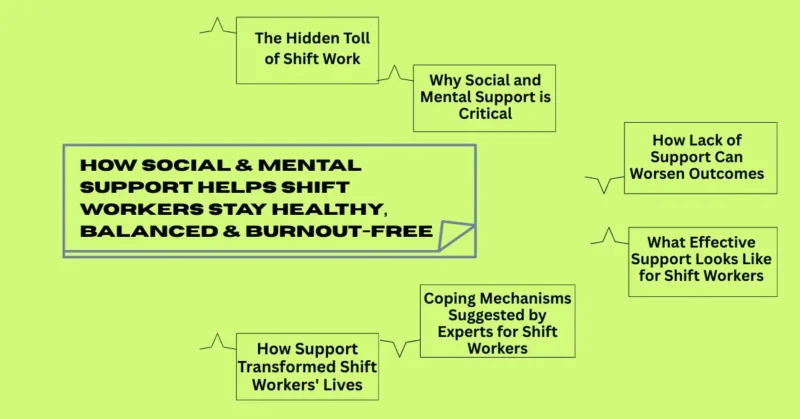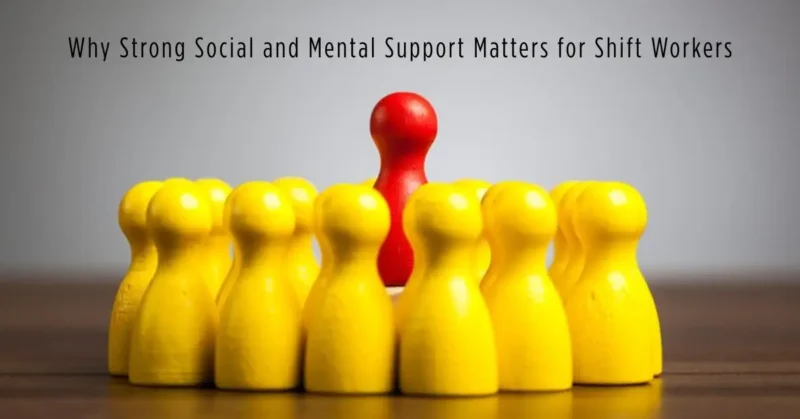Shift work can take a serious toll on mental health, sleep, and social life. Discover how strong social and mental support systems help shift workers fight burnout, balance life, and stay emotionally resilient.
Thank you for reading this post, don't forget to subscribe!How Social & Mental Support Helps Shift Workers Stay Healthy, Balanced & Burnout-Free
Working odd hours, rotating shifts, or overnight jobs isn’t just physically demanding — it’s a constant battle against your body’s natural rhythm. Shift workers often face chronic sleep deprivation, emotional exhaustion, and the silent strain of missing out on family events, social gatherings, and simple daily routines.
Research consistently shows that irregular work schedules can disrupt circadian rhythms, increase the risk of anxiety, depression, and burnout, and weaken personal relationships. Without strong mental and social support, many shift workers quietly endure rising stress levels, isolation, and even serious health problems.
But the good news? Creating trustworthy support networks at work and home can make all the difference. To be resilient, safeguard their well-being, and succeed in demanding schedules, shift workers benefit from social ties, emotional support, and easily accessible mental health resources. In this post, we’ll explore exactly why these support systems matter — and how they can make shift work healthier, happier, and far more sustainable.

Section 1: The Hidden Toll of Shift Work
Shift work may seem manageable on the surface, but it comes with hidden challenges that can significantly impact both mental and physical health. Let’s explore the deeper impact shift work has on overall well-being.
For many shift workers, the hidden costs of irregular schedules go far beyond fatigue. Working erratic hours disrupts the body’s circadian rhythm, making it harder to fall asleep, stay asleep, and feel alert during the day. Immune system weakness, physical exhaustion, and cognitive dullness are the inevitable results of prolonged sleep deprivation.
But the impacts go beyond one’s physical health. Burnout, anxiety, and despair are among the startlingly prevalent mental health issues that shift workers face. The constant juggling of odd hours missed family events, and social disconnection places enormous emotional strain on individuals and their loved ones. It leads to a vicious cycle: poor sleep worsens emotional stability, and emotional distress further disrupts rest.
Shift work disorder, a medical ailment characterized by severe insomnia and excessive daytime sleepiness, can occasionally strike shift workers. Untreated mental illness impacts interpersonal connections as well as professional performance, raising the possibility of marital stress, difficulties as a parent, and a general deterioration in emotional health.
The first step in developing more efficient support networks that safeguard mental health and promote individual resilience is to comprehend these hidden costs.
Section 2: Why Social and Mental Support is Critical
While shift work often isolates individuals from traditional social circles, strong social and mental support can make a profound difference. Human beings are wired for connection, and shift workers are no exception.
A solid support system, including family, friends, and coworkers, helps prevent feelings of isolation and loneliness that often accompany irregular work hours. Emotional check-ins, understanding loved ones, and flexible communication foster a sense of belonging, even when schedules clash.
Beyond companionship, support networks enhance psychological resilience, equipping shift workers with healthier coping mechanisms for stress, fatigue, and emotional fluctuations. When challenges arise, having someone to listen, empathize, and offer practical help can reduce anxiety, enhance mood, and promote faster recovery from stressful events.
Healthy relationships not only alleviate mental burdens but also foster healthier habits, such as maintaining proper sleep hygiene, managing stress effectively, and seeking professional care when necessary. In short, social connection and mental health are closely intertwined, creating a protective buffer that empowers shift workers to navigate their unique lifestyles with confidence and stability.

Section 3: How Lack of Support Can Worsen Outcomes
Without solid emotional and social support, shift workers often find themselves in a perilous downward spiral that can impact all aspects of their lives.
An elevated risk of weariness and burnout is among the most direct effects. Without effective burnout prevention, constant physical strain and emotional stress begin to pile up. The irregular sleep patterns of shift work already tax the body, and without a support system to help balance these demands, workers may find themselves chronically exhausted, both physically and emotionally.
As fatigue builds, so do stress levels. Without access to healthy stress management techniques, minor setbacks can start to feel overwhelming. Everyday challenges such as meeting work deadlines, managing home responsibilities, or even maintaining relationships become sources of anxiety. Over time, the lack of coping resources may lead to irritability, poor decision-making, and even clinical anxiety or depression.
The absence of proper support also puts a strain on both personal and professional life. Relationships with family, friends, and coworkers can suffer due to mood swings, missed commitments, and a lack of emotional availability. At work, concentration issues, reduced productivity, and increased absenteeism may emerge, jeopardizing job performance and long-term career prospects.
Ultimately, the combination of unmanaged fatigue, rising stress, and lack of emotional outlets can create a serious health risk. For shift workers, building effective support systems isn’t just helpful — it’s essential for long-term well-being and career sustainability.
Section 4: What Effective Support Looks Like for Shift Workers
The good news is that with the right support systems in place, many of the challenges of shift work can be successfully managed and even prevented.
At the core of effective support is family support for shift workers. Open communication about work schedules, sleep needs, and emotional well-being helps family members better understand and accommodate the unique demands of shift work. Maintaining healthy relationships can be significantly impacted by small actions, such as showing emotional support, scheduling family time around work shifts, and honoring quiet hours.
In the workplace, peer support networks serve as a valuable resource. Colleagues who share similar experiences often understand the physical and emotional challenges better than anyone else. Regular check-ins, sharing coping strategies, and offering mutual encouragement foster a sense of camaraderie that helps reduce feelings of isolation.
Employers also play a vital role by providing shift workers with occupational health and mental health programs in the workplace. These may include access to counseling services, stress management workshops, flexible scheduling options, and educational resources on sleep hygiene and self-care. When companies prioritize the mental and emotional health of their shift workers, they foster a healthier, more engaged, and more productive workforce.
Effective support systems for night shift workers aren’t one-size-fits-all. Still, with a combination of family understanding, peer support, and employer-provided resources, shift workers can develop resilience, maintain balance, and protect both their mental and physical health.
Section 5: Coping Mechanisms Suggested by Experts for Shift Workers
Dealing with the mental and physical demands of shift work requires more than willpower — it calls for intentional, expert-backed strategies that target the root causes of exhaustion, stress, and emotional imbalance. Here’s how shift workers can regain control and protect their well-being:

1. Prioritize Sleep Hygiene to Manage Circadian Rhythm Disruption
Shift work often forces people to sleep during biologically unnatural hours, disrupting the body’s internal clock, known as the circadian rhythm. This disruption can lead to insomnia, chronic fatigue, and mood swings. That’s why good sleep hygiene is a non-negotiable part of any effective coping strategy for shift work.
Practical Tips:
- Use blackout curtains or eye masks to simulate nighttime during day sleep.
- Maintain a consistent sleep-wake schedule, even on days off.
- Avoid caffeine or heavy meals within 4 hours of bedtime.
- To drown out the sounds of the day, consider using earplugs or a white noise device.
Aligning your lifestyle with your work schedule as much as possible helps your body adjust and reduces the intensity of circadian rhythm misalignment.
2. Adopt Daily Stress Management and Mindfulness Techniques
Long shifts, unpredictable schedules, and social isolation create the perfect storm for chronic stress. Integrating stress management techniques into your daily routine can help balance your emotional state and reduce tension.
Expert-Recommended Strategies Include:
- Practicing deep breathing or guided meditation before bed or during breaks can help you relax and unwind.
- Engaging in physical activity (even short walks or stretches between shifts).
- Journaling or tracking moods can help you become more aware of emotional triggers.
- Using apps like Headspace or Calm to build a habit of mindfulness.
Even in chaos, these routines serve as emotional anchors, helping shift workers regain their composure.
3. Nurture Strong Relationships for Emotional Balance
Supportive relationships act as buffers against stress, loneliness, and burnout. For shift workers, intentionally cultivating these bonds is essential, not optional.
How to Strengthen Connection:
- Communicate openly with loved ones about your needs and boundaries.
- Schedule regular check-ins, even if brief, with family or close friends.
- Join local or online communities of shift workers to share stories and tips.
Strong social ties help shift workers process emotions, share burdens, and stay motivated, which is why relationship-building is a core part of successful coping strategies for shift work.
4. Don’t Hesitate to Seek Professional Help
Sometimes, the toll of shift work exceeds what self-help can handle. If symptoms of anxiety, depression, or burnout persist, speaking to a mental health professional is a wise step, not a weakness.
What to Look For:
- Therapists or counselors who understand occupational health
- Employer-provided mental health programs or EAPs
- Online therapy platforms for flexibility with odd hours
Timely professional support can prevent minor struggles from turning into long-term disorders and reinforce your overall mental fitness.
Section 6: Real-Life Stories – How Support Transformed Two Shift Workers’ Lives
Nothing illustrates the power of support better than real experiences. Here are two powerful examples of how shift workers transformed their lives with the right support.
Case Study 1: Maria – A Night Nurse Who Reclaimed Her Mental Health

Maria, a 34-year-old ER nurse working overnight shifts, was on the verge of quitting. Years of chronic sleep loss missed family events, and rising anxiety had left her feeling isolated and emotionally drained. She was diagnosed with shift work disorder and referred to an occupational therapist through her hospital’s mental health program.
With the support of her team, she implemented a strict sleep hygiene routine using blackout blinds and melatonin, began journaling before bed, and scheduled weekly family dinners. Within three months, her energy improved, her mood stabilized, and she even began mentoring younger nurses who were struggling with the same issues.
Transformation Insight: A mix of professional help and strong family communication helped Maria rebuild her resilience.
Case Study 2: Jamal – A Warehouse Worker Who Found Strength in Peer Support
Jamal, a 29-year-old warehouse shift supervisor, struggled with emotional well-being due to long overnight shifts and limited social contact. Frustrated and exhausted, he joined a small peer-led WhatsApp group formed by coworkers who shared tips on managing fatigue at work, nutrition during night shifts, and maintaining work-life balance.

That peer support network gave Jamal the motivation to make small changes, like using stress-busting breathwork techniques during breaks and talking openly about emotional challenges. Over time, his confidence grew, and his stress levels dropped significantly.
Transformation Insight: Peer relationships helped Jamal feel less alone and empowered him with practical coping strategies in real-world situations.
These stories demonstrate that, regardless of the challenging schedule, the right support systems for shift workers — whether through family, peers, or professionals — can lead to lasting, positive change.
FAQs
Q. Why is social support important in mental health?
Social support plays a crucial role in maintaining mental health by providing emotional comfort, reducing stress, and helping individuals navigate life’s challenges. When people feel connected to family, friends, or peers, they’re more likely to share their feelings, seek advice, and cope better with anxiety or depression.
To prevent burnout and mental fatigue, supportive relationships serve as a buffer against emotional distress. For shift workers, who often face irregular schedules, having a strong support system becomes even more vital. It helps combat feelings of isolation and loneliness, which are common in non-traditional work patterns.
Research consistently shows that individuals with strong social ties experience better mood stability and overall life satisfaction. In short, social support is a protective shield for emotional resilience.
Q. How does a shift work impact mental health?
Shift work disrupts the body’s natural circadian rhythm, leading to sleep deprivation, chronic fatigue, and mood instability. This constant battle against the internal clock increases the risk of anxiety, depression, and emotional burnout over time. Irregular work hours also interfere with social activities and family time, contributing to feelings of isolation and loneliness.
The lack of routine makes it harder to maintain healthy eating, exercise, and self-care habits, which further affect mental well-being. Shift work disorder, a condition specific to irregular schedules, can cause severe insomnia and daytime drowsiness. Without proper coping strategies or support systems, mental health challenges can escalate quickly.
Long-term shift workers often require extra attention to sleep hygiene, stress management, and emotional support to maintain balance.
Q. Why is mental health important in the workplace?
Mental health has a direct impact on employee performance, productivity, and overall job satisfaction. Workers with good mental health are better equipped to focus, make informed decisions, and effectively manage work-related stress. In contrast, poor mental health can lead to absenteeism, reduced engagement, and higher turnover rates; for shift workers who already face unique stressors, workplace mental health support becomes even more essential.
Programs like counseling, flexible scheduling, and wellness resources help employees manage emotional challenges. A supportive workplace culture also fosters open communication and reduces stigma around mental health discussions. Ultimately, investing in mental health benefits both employees and employers by fostering a healthier and more resilient workforce.
Q. How can shift work affect your social life?
Shift work often leads to missed family gatherings, social events, and even everyday interactions, making it challenging to maintain close relationships. Irregular hours can leave shift workers feeling disconnected from friends and loved ones who operate on a traditional schedule.
Over time, this disconnection can foster feelings of loneliness, isolation, and even resentment. The lack of regular social engagement also deprives workers of emotional outlets and peer support. Romantic relationships and parenting responsibilities can be particularly strained when schedules are mismatched.
Without proactive efforts to schedule quality time and maintain communication, personal connections may weaken. However, with strong support systems and intentional relationship-building, many shift workers successfully balance their social and work lives.
Conclusion: The Power of Support in the Shift Work Journey
Shift work comes with unavoidable challenges — from circadian rhythm disruption and sleep deprivation to mental health challenges like burnout, anxiety, and emotional strain. Without strong support systems, these issues can quietly erode both personal happiness and professional success. However, the good news is that shift workers are not powerless.
By prioritizing coping strategies for shift work, such as maintaining proper sleep hygiene, practicing daily stress management techniques, engaging in mindfulness practices, and fostering intentional relationships, it’s possible to build resilience against the demands of non-traditional work schedules.
Equally important is seeking out the right support systems for night shift workers — whether that’s open communication with family, peer support networks at work, or accessing workplace mental health programs designed specifically for shift workers.
The real-life stories of Maria and Jamal prove that with the right support and proactive strategies, shift workers can not only survive but thrive, even in the most demanding roles. Investing in social, emotional, and professional support isn’t just beneficial — it’s essential for preventing long-term burnout, maintaining emotional stability, and achieving a better quality of life.
If you’re a shift worker (or support one), remember: you don’t have to face these challenges alone. With the right help, balance and well-being are entirely within reach.
Read more Life-Balance & Health Tips.
You might like:

